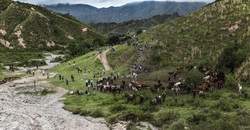IWGIA | 3 October 2017
New green powers in the global land grab violate indigenous peoples’ rights
New green powers in the global land grab violate indigenous peoples’ rights
LAND RIGHTS: Industries and investors lead the global land grab for new agribusiness and green projects at the cost of local communities and indigenous peoples. A new report guides you through the complexities and the legal frameworks related to human rights and today’s scramble for land.
Violations of indigenous peoples’ rights come in many colours.
Mining, logging and other extractive industries have traditionally been some of the main threats to indigenous peoples’ land. But new and green powers have entered the race for land.
Green grabbing on the rise
Nature conservation and green market development are increasingly involved in land grabbing and evictions of indigenous peoples according to a new report on land grabbing and indigenous peoples published by IWGIA.
The new mode of green grabbing includes acquiring lands for the development of green markets such as forestry for carbon offsetting, biofuels and ecotourism.
Establishment of national parks and nature conservation too often have a negative impact on indigenous peoples who are falsely perceived as intruders. A new report by Survival International backs these findings up.
Marianne Wiben Jensen, IWGIA’s Senior Advisor in Land Rights, says:
”It is no longer only the usual extractive companies that are leading the global land grab, as new powerful players such as agribusiness and green energy are also driving global land grab. Across the board indigenous peoples’ rights are being ignored – but there and it is more important than ever for the international community to secure the rights of indigenous peoples.”
The new report, therefore, gives a comprehensive overview of the legal instruments, national policies and international standards related to land rights and human rights followed-up by a set of recommendations. The aim is to give states, the private sector and civil society guidance to the legal frameworks.
Investors are favoured politically
The ongoing land grab is made possible by large investments. The case of Standing Rock shows that investors - pension funds, sovereign wealth funds, private equity funds, Western banks and financial investors - play a predominant role in financing the global land grab.
China, India, South Korea and the Gulf States are at the forefront of the agricultural expansion, as they seek to produce food overseas for their growing populations. However, the biggest country investors in terms of outward foreign direct investment (FDI) in agribusiness include Canada, USA, and Denmark.
As the current global land grab is driven by a complex multitude of actors, land deals, in general, lack transparency. So when local communities and indigenous peoples try to detect who stands behind land grabs, they are often lost in a complex web of multiple actors and layers.
The new report published by IWGIA concludes, the investors are usually favoured within the political, economic and legal frameworks. With case studies from Tanzania, Kenya, India, Myanmar, Colombia, Chile and Russia the report shows, how laws and policies adopted by States, international financial organisations and investment funds mainly support the rights of the investors rather than the local and indigenous communities.
ABOUT THE REPORT
Title: Land grabbing, investments & indigenous peoples’ rights to land and natural resources: Legal analysis and case studies from Tanzania, Kenya, India, Myanmar, Colombia, Chile and Russia
Authored by: Jérémie Gilbert
Edited by: Marianne Wiben Jensen and Genevieve Rose
Published by IWGIA with financial support from the Danish Ministry of Foreign Affairs
Publication date: 3 October 2017
Pages: 53













